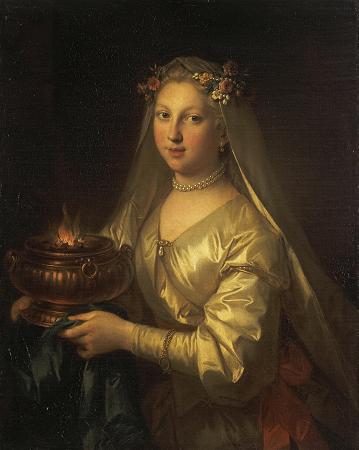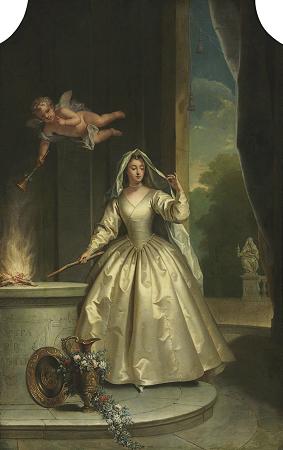Vestal Virgin (c-700 - c50). In ancient Rome, the Vestals or Vestal Virgins were priestesses of Vesta, goddess of the hearth. The College of the Vestals and its well-being were regarded as fundamental to the continuance and security of Rome. They cultivated the sacred fire that was not allowed to go out. The Vestals were freed of the usual social obligations to marry and bear children and took a 30-year vow of chastity in order to devote themselves to the study and correct observance of state rituals that were forbidden to the colleges of male priests. Livy, Plutarch, and Aulus Gellius attribute the creation of the Vestals as a state-supported priestesshood to king Numa Pompilius, who reigned circa 717-673 BC. According to Livy, Numa introduced the Vestals and assigned them salaries from the public treasury. Livy also says that the priestesshood of Vesta had its origins at Alba Longa. The 2nd century antiquarian Aulus Gellius writes that the first Vestal taken from her parents was led away in hand by Numa. Plutarch attributes the founding of the Temple of Vesta to Numa, who appointed at first two priestesses; Servius Tullius increased the number to four. Ambrose alludes to a seventh in late antiquity. Numa also appointed the pontifex maximus to watch over the Vestals. The first Vestals, according to Varro, were named Gegania, Veneneia, Canuleia, and Tarpeia. Tarpeia, daughter of Spurius Tarpeius, was portrayed as traitorous in legend. The Vestals became a powerful and influential force in the Roman state. When Sulla included the young Julius Caesar in his proscriptions, the Vestals interceded on Caesar's behalf and gained him pardon. Augustus included the Vestals in all major dedications and ceremonies. They were held in awe, and attributed certain magical powers. Pliny the Elder, for example, in Book 28 of his Natural History discussing the efficacy of magic, chooses not to refute, but rather tacitly accept as truth. At the present day, too, it is a general belief, that our Vestal virgins have the power, by uttering a certain prayer, to arrest the flight of runaway slaves, and to rivet them to the spot, provided they have not gone beyond the precincts of the City. If then these opinions be once received as truth, and if it be admitted that the gods do listen to certain prayers, or are influenced by set forms of words, we are bound to conclude in the affirmative upon the whole question. The urban prefect Symmachus, who sought to maintain traditional Roman religion during the rise of Christianity, wrote: The laws of our ancestors provided for the Vestal virgins and the ministers of the gods a moderate maintenance and just privileges. This gift was preserved inviolate till the time of the degenerate moneychangers, who diverted the maintenance of sacred chastity into a fund for the payment of base porters. A public famine ensued on this act, and a bad harvest disappointed the hopes of all the provinces. it was sacrilege which rendered the year barren, for it was necessary that all should lose that which they had denied to religion. The College of the Vestals was disbanded and the sacred fire extinguished in 394, by order of the Christian emperor Theodosius. Zosimus records how the Christian noblewoman Serena, a niece of Theodosius, entered the temple and took from the statue of the goddess Rhea Silvia a necklace and placed it on her own neck. An old woman appeared, the last of the Vestals, who proceeded to rebuke Serena and called down upon her all just punishment for her act of impiety. According to Zosimus, Serena was then subject to dreadful dreams predicting her own untimely death.
more...





